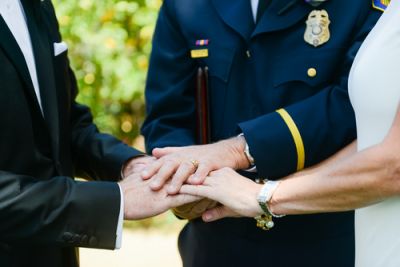 You pay attention to every detail when planning your wedding. Everything from the food to your attire gets an extra measure of scrutiny. If you’re choosing your own officiant, you’ll take just as much care with your search. How do you find the perfect person to perform your ceremony? Some basic information and instructive advice can help you make the best choice for your wedding.
You pay attention to every detail when planning your wedding. Everything from the food to your attire gets an extra measure of scrutiny. If you’re choosing your own officiant, you’ll take just as much care with your search. How do you find the perfect person to perform your ceremony? Some basic information and instructive advice can help you make the best choice for your wedding.
Marrying in a House of Worship
If you’re marrying at your house of worship, you’re probably relying on its affiliated clergy to conduct the ceremony. Wedding Wire’s Stephanie Weers explains that some can perform weddings at other venues, while others are restricted to their own church or temple. Such rules differ within each religion and denomination, so check with your clergy to learn the specific regulations for your faith. You may be able to wed in a house of worship if you’re not a member of its faith, but you could be required to attend counseling sessions.
Options for Secular Ceremonies
When looking for an officiant, your first step is deciding what type you need. Some civil officials are authorized to perform marriages, and depending on where you live, these can include judges, mayors, public notaries, magistrates, or justices of the peace. If you’re planning to elope or want a very simple event with a small guest list, getting married by a civil official may be the best option.
Professional officiants are licensed and authorized by a jurisdiction to solemnize weddings and can include people who perform spiritual, secular, or interfaith weddings. You’ll find professional officiants through web searches, in wedding vendor directories, or even in special sources such as LGBTQ-friendly business directories. Some are ordained by organizations like the Universal Life Church.
If none of these options are available, you may wish to consider having a close friend perform the ceremony. You should check the laws in your jurisdiction to confirm whether the marriage will be valid, and your friend may need to meet registration and licensing requirements.
Conducting Your Search
Once you have an idea of what type of officiant you need, it’s time to begin your search. Martha Stewart Weddings recommends looking for your professional at least six months before the big day. To compile a starter list of candidates, you should ask a few key questions. Both Stephanie Weers and Martha Stewart Weddings’ Nicole Harris make some useful suggestions:
- Can you perform a wedding ceremony at our chosen date and time?
- Are you legally sanctioned to solemnize marriages in our wedding’s location?
- Are there any traditions or beliefs that prevent you from officiating our wedding?
- How many ceremonies have you performed?
- What fees do you charge for your service?
- What are your backup options in case an emergency makes you unable to officiate?
- Do you offer premarital counseling?
- Can you help us complete and file our marriage license?
Narrowing Down Your Final Choices
From these questions during your initial search, you should compile a final round of potential officiants. At this stage, you need to meet with your prospective choices and get to know them. Discuss key issues such as personalizing your ceremony, communication styles, and rehearsals. Southern Bride and Groom stresses that the ultimate goal is finding an officiant with whom you’re comfortable working. When you’ve settled on an individual, your final steps are reviewing and signing the contract.
A wedding officiant does more than simply conduct the ceremony. This individual also helps set its tone, make your guests feel welcome, and assist with the event’s overall flow. Knowing your needs, conducting diligent research, and trusting your instincts can aid you in finding the right professional.
Add Your Comment